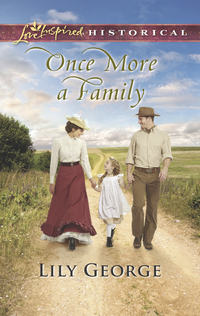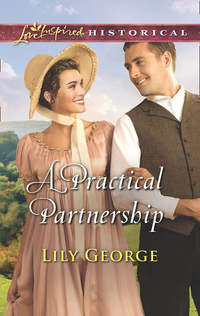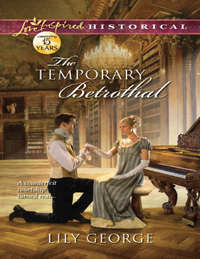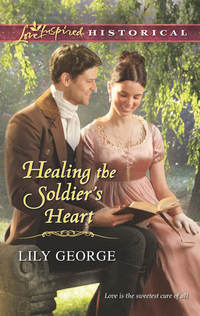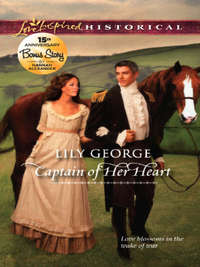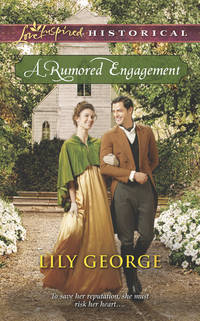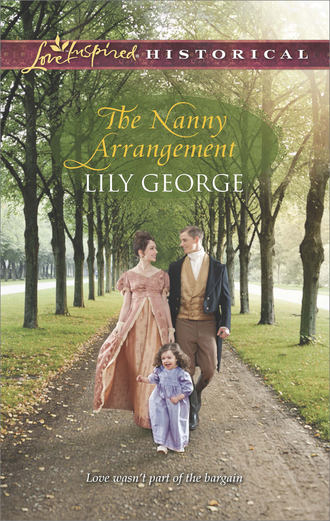
Полная версия
The Nanny Arrangement

A family in the making
Becoming nursemaid to Paul Holmes’s orphaned niece seems like the perfect solution to Becky Siddons’s problems. After having her romantic hopes dashed, she’s determined to focus solely on her charge and not the little girl’s handsome uncle. Until Becky realizes she is losing her heart to a man determined to keep his own under lock and key….
Paul had hoped hiring Becky would allow him to keep a distance from his niece, a reminder of his late sister—and his failings in raising her. Yet he soon finds himself enjoying spending time with outspoken, impulsive Becky and the child. Can he take a chance on this unexpected, joyful new family?
Her gaze was making him distinctly uneasy. Somehow, it was as though she had the upper hand.
The only way to win back control was to return to his sarcastically amused self. “So. Now that’s been decided. Join me for tea in a few moments in the library.”
“No thank you, Mr. Holmes. I know my place. I shall retire to my room and ring for tea when I am ready for it.” She gave another brief curtsy that signaled—more clearly than speech—that he was being summarily dismissed.
Should he press on? Make her come down to tea? After all, he had wanted to speak with her about Juliet’s upbringing. He glanced at the set of her jaw and the fire in her eyes. No. Better to leave while he still had some modicum of authority.
He’d give her time to cool off, and then they would speak sensibly. Becky Siddons was supposed to solve his problems and make life easier for him. But already she was causing more trouble than he’d ever dreamed.
LILY GEORGE
Growing up in a small town in Texas, Lily George spent her summers devouring the books in her mother’s Christian bookstore. She still counts Grace Livingston Hill, Janette Oke and L. M. Montgomery among her favorite authors. Lily has a B.A. in history from Southwestern University and uses her training as a historian to research her historical inspirational romance novels. She has published one nonfiction book and produced one documentary, and is in production on a second film; all of these projects reflect her love for old movies and jazz and blues music. Lily lives in the Dallas area with her husband, daughter and menagerie of animals.
The Nanny Arrangement
Lily George

I am the vine, you are the branches.
He who abides in Me, and I in him,
bears much fruit; for without Me you can do nothing.
— John 15:5
For Olivia and Taylor,
whose two-year-old antics inspired Juliet.
For Maddie and every child battling cancer. #fightformaddie
Contents
Cover
Back Cover Text
Introduction
About the Author
Title Page
Bible Verse
Dedication
Chapter One
Chapter Two
Chapter Three
Chapter Four
Chapter Five
Chapter Six
Chapter Seven
Chapter Eight
Chapter Nine
Chapter Ten
Chapter Eleven
Chapter Twelve
Chapter Thirteen
Chapter Fourteen
Chapter Fifteen
Chapter Sixteen
Chapter Seventeen
Chapter Eighteen
Chapter Nineteen
Chapter Twenty
Dear Reader
Questions for Discussion
Extract
Copyright
Chapter One
Tansley Village, Derbyshire
Spring 1811
The letter from the penny post gave a nervous crackle as Rebecca Siddons, commonly known to family and villagers alike as Becky, withdrew it from the willow basket she used for her weekly marketing. Her heart thumped solidly against her rib cage as she glanced over the fine, meticulous handwriting on the envelope. Yes, it was from Lieutenant Walker. She hadn’t heard from him in ever so long. One would expect a letter sooner from a young man who was, hopefully, soon to be one’s fiancé.
She’d lain awake night after night since the lieutenant’s regiment left the village, praying for his safety. And when no word came—well, it was difficult indeed not to imagine the worst. But at long last, he’d sent a painfully thin missive. Perhaps his duties at his new post kept him too busy to compose any letter of great length.
Becky turned off the well-beaten path along the storefronts of the tiny village and struck out into the open. One couldn’t read a letter like this in the confines of the prim and proper millinery shop she kept with her younger sister, Nan. She certainly couldn’t bear to dawdle along, snatching glimpses of her letter while making polite conversation with passersby.
No. For this letter, she craved the wild freedom of the moor.
Becky dashed across the meadow, the long grass catching at her skirts as she ran, her bonnet wrenching free of its hold and dangling down her back like a useless sack. Her long mahogany curls tossed breezily in the wind. Yes. One could breathe up here. One could dream romantic, impossible dreams without being dragged down to earth by a practical little sister or a bossy older one.
She flung her basket aside and with shaky fingers broke the seal of the letter. Would he ask her to join him in Liverpool? Had he finally kept the unspoken promise between them? At last she would be wed to a dashing military hero, have a home of her own, to be a mistress of that house...everything her elder sister Susannah had, and which Becky secretly envied.
My dear Miss Siddons—
Rather formal, but perhaps he had fears of their secret romance becoming too quickly public?
I must tell you that I have met and married the sweetest girl here in Liverpool. I know you will rejoice in our happiness, as kind and generous as you are. Her name is Rachel—
A faint buzzing sounded in her ears. Becky gave a quick, decisive shake of her head. Either her eyes were playing tricks on her, or this was some sort of cruel joke. Surely Lieutenant Walker felt about her as she felt about him. With an achy heart, she grasped one of her curls and wound it about her finger, a gesture that brought comfort to her since childhood. The smiles they’d shared, the lingering glances, the brief touch on her arm as he bade her goodbye...
She opened her eyes wide and forced herself to read each word deliberately and slowly, until she reached the end of the letter. This Rachel was her lieutenant’s new bride. When she, Becky, had been so certain that she would, in a matter of months, bear that title.
The weight of dawning realization pushed down her shoulders, forcing her to her knees in the grass. The letter fluttered away and caught on a twig. Hot tears pooled in Becky’s eyes and she pursed her trembling lips. No wedding was hers, with redolent orange blossoms. No home of her own waited patiently for its mistress. She must continue to toil away in her millinery shop with Nan and her blunt, practical ways, her constant criticisms and complaints draining the very artistry from Becky’s days. She was both a spinster and a fool.
Becky dropped her head in her hands and allowed the tears to fall, deep, wrenching sobs that convulsed her as she knelt in the rough, scrubby stalks. Her heart thumped in her chest, the sound growing louder as she continued to weep.
She must inhale. Otherwise, she might faint. She took a hitching, jolting breath. Her heart was pounding heavily.
No. She raised her head, forcing her streaming eyes open.
No—not her heart. Hoof beats.
“Ho there!” the rider called in a deep bass voice, reining in sharply. His mount, a magnificent sorrel, made a jagged turn to the right, showering Becky with stinging little blades of grass as he skidded to a halt. Becky froze, her sobs quelled as she watched the precision and control with which the rider managed his horse. He dismounted in one easy, fluid movement and tossed the reins over the saddle.
“Really, miss,” he scolded. “What on earth are you playing at, hiding out here in the moor? I could have run you over.” He strolled over, tucking his riding crop under one arm, and removed his hat.
As he looked down, Becky gave an inward groan. How perfectly perfect, as her sister would say. Here she was sobbing out here on the moor over her lost dreams and hopes, and along came Paul Holmes, her brother-in-law’s teasing and jesting friend.
“Becky—what on earth? Are you quite all right?” He held out his hand and she took it, allowing him to pull her up from her hovel in the grass. “Whatever has happened?”
“I—uh.” She couldn’t brazen this one out. She must look a sight. Her nose must be swollen, her eyes must be the color of a tomato, and tear tracks must certainly have trailed down her cheeks. And yet, one couldn’t let Paul in on the most private, secret dashed hopes of her girlhood. Paul was so intimidating, really. He was handsome, with dark brown eyes and sandy, wavy hair that always looked rather tousled. And he was wealthy. But what made him most nerve-racking was his teasing manner, coupled with his high-handed attitude. If she spoke the truth, he’d laugh. Or lecture. And she didn’t particularly relish hearing either right now. “I received a letter with some distressing news.”
“I am sorry to hear it.” He fumbled in his jacket pocket and withdrew a fine linen handkerchief. “Here, blow your nose. There’s a good gal.” He held the crisp linen square to her nose as if she were a mere five years old.
“I can handle it by myself, thank you,” she responded in her haughtiest tone, and took the handkerchief with as much dignity as she could muster. After being jilted by one man, she was having a difficult time being civil to another, especially one who treated her as a child.
She gave her nose a hearty blow—not a romantic sound, but then who could think of romance now? She flicked a glance over at Paul. His sandy hair blew untidily in the wind, and his brown eyes held a distinct gleam of mockery. He was tall and powerfully built, but for all the handsome figure he cut, one couldn’t get past the feeling that he was laughing at everything in general and her predicament in particular. She must compose herself before going back to the millinery shop, and how could she do it now, with Paul standing like a comical sentry before her?
“I really should be going back,” she managed, folding the handkerchief into a dainty square. “Thank you for the use of this. I shall launder it and return it to you.”
“No need, no need.” He brushed aside his handkerchief the way some men might brush aside a scrap of paper. And it was fine Irish linen, too, quite dear. The kind of material they sometimes received in their shop for the use of the gentry. “And I wouldn’t dream of you going back by yourself. Not in this condition. I could never look Susannah or Daniel in the eyes again if I left you weeping all alone on this dreadful moor.”
“My sister and brother-in-law don’t have to know about this.” The words tumbled out before she could check them. No, indeed. No one need ever find out if only Paul could leave well enough alone. “I was crying over a private matter, and now I feel better.”
“But you look miserable.” Paul strolled over to his horse and gathered the reins.
“Thank you.” She could not check the sarcastic tone. What was coming over her? Usually Susannah was the sharp one and Nan the biting one. She’d hardly ever uttered an acerbic comment in her life.
Her tone must have shocked Paul, for his grin faded and he cocked one eyebrow at her. “I didn’t mean that in an insulting way. I just mean that, whatever your news was, it must have been quite shocking. I’ve never seen you behave in such a manner.” He led his horse over to her, pausing to scoop up her basket and the letter still tangled against a twig. “Here. Jump up. I’ll lead you. I am sure you’ll feel better once you go home and see Nan, and start work on a new bonnet.”
“You sound like Susannah. Work is not my panacea. And Nan is so...difficult.” She folded her arms across her chest. “I’d like to stay here a bit longer.” She couldn’t face the prosaic reality of her life once more. She had to stay out in the moor just a few moments more and lick her wounds in private. If only he would just go away and leave her in peace.
“Nan has always been trying, hasn’t she?” Paul leaned against his mount, fixing her with his mildly amused gaze. “What makes her company so unendurable today?”
“Because...” Becky paused. How much should she say? She couldn’t tell Paul that her marriage prospects were now completely obliterated and she’d be living under her little sister’s thumb for all eternity. “Susannah was the heart behind our business. And now she is married and committed to managing Goodwin Hall. Nan is the brains behind the business.” She couldn’t tell him the whole truth. ’Twould sound too selfish and childish to admit that she was stuck in the middle, not allowed to make any business decisions, her designs often hampered because they were too expensive or too fancy or too delicate for rural wear. She wasn’t consulted as an artist, and her opinion was often simply passed over.
“And as for you...you’ve no real place.” He nodded. How funny. ’Twas as though he understood her thoughts precisely and yet didn’t think her quite a ninny for feeling them. “Have you ever thought about something else? Do you have to work in the shop, Becky?”
“I thought my circumstances might soon change, but they won’t, so I might as well face facts.” She looked at him squarely, though it was terribly difficult to do so. It wasn’t that she was afraid of Paul—he wasn’t a scary sort of person. He just made her nervous with his joking ways.
His expression shifted, and the vague sympathetic moment they’d shared vanished like ice melting in the sun. “I think the reason you’re out here sobbing is in this letter I found.” He cast a crooked grin her way and tapped Lieutenant Walker’s letter against his chin with a mockingly thoughtful gesture. “Shall I read it and find out?”
* * *
That was a mistake. Paul had pushed the teasing too far, just as he had with his own younger sisters. Becky’s fine, dark brows drew together as she made an impetuous grasp for the letter.
“Give it back to me,” she pleaded, her violet-blue eyes sparkling with fresh, unshed tears. “You have no right to take my private property.” She extended her small, trembling hand out, palm up.
He swallowed, giving himself an inward kick. Here he was, making matters worse when she had finally begun to calm down. He pressed the epistle back into her hand, taking a quick glance down as his did so. Bold, decisive script—definitely the handwriting of a man. Likely she had been jilted in some form or fashion by some ridiculous blackguard. And that was the reason she was out here crying—she’d lost her chance that marriage would end her servitude at the shop.
“You’re right, I don’t.” He shrugged and handed her back the basket she’d dropped. “Forgive me. It’s the privilege of being the eldest brother, you see. I always teased my younger siblings in a merciless fashion.”
“I’d love to have a fraction of your license,” Becky admitted, the ghost of a smile hovering around her pretty lips.
She looked a little like his younger sister Juliana, though Becky’s features were softer, more feminine. Juliana, too, had had her heart broken by an undeserving male.
“I had no idea you had so many brothers and sisters to lord over.”
“Oh yes, Juliana is close to your age.” Or was. One short week was hardly enough time to adjust to the fact that his beautiful young sister was—but no. This wasn’t the time or place for such thoughts. He stifled a cough and continued with a happier memory. “But she always got her revenge. Once, Juliana put pepper in my snuffbox. You can only imagine how long it took me to recover.”
Becky laughed, a dimple touching her left cheek as she smiled. “Jolly good for her.” Then her laughter ceased, and the dark shadow fell over her face once more. The change was disappointing, for Becky was a pretty little thing. With her dimpled cheek and that dark waterfall of hair, she could certainly become a diamond of the first water, had her family been able to give her a season. Funny, he’d always thought of her as just the middle daughter of an extraordinary family...but she was coming into her own now. Not that it mattered to him, of course.
“I don’t suppose I’ve convinced you to return to the shop, then?” He gave the reins a tug, and Ciro stopped munching the moor-grass. He had business to attend to, and couldn’t spare any more time talking to a girl, appealing though she might be.
Becky shook her head, the wind ruffling her curls. “No, thank you.”
“Well, if you insist on staying out here, then I must ask you to at least stand upright.” He swung into the saddle and settled in comfortably. “I could have run over you, buried as you were in the grass.”
Becky’s delicate features hardened and she turned her head aside. “I promise I won’t do anything as silly as allow myself to be run over. You might be more careful yourself, you know.”
He suppressed a grin at her haughty tone. She certainly hated being told what to do. No small wonder, being squeezed in between two termagants like Susannah and Nan. Just to be perverse, he leaned down over his saddle and fixed her with his best “lord of the manor” gaze. “If you aren’t home by sundown, I shall tell Daniel and Susannah that you were wandering the moor like some lovesick heroine in a Romantic poem.”
She turned, lifting her chin and fixing him with a glare that could have withered the moor-grass. “When I come home is entirely my own affair, Mr. Holmes. Your friendship with my family does not extend to playing the role of my keeper.” Apparently he offended her so greatly that she chose to abandon her earlier plan of remaining on the moor. She tucked the willow basket and her letter under her arm and strolled off, her bonnet bobbing against the middle of her back as she wound her way back to the village.
He chuckled ruefully. Whatever had that lad who jilted Becky been thinking? The fellow couldn’t be in his right mind. Paul gave Ciro his head and the beast responded with astonishing speed, carrying him over the moor and back toward home with grace and agility. He never really had to think when he was riding Ciro. The horse had such an uncanny sense of timing and pace. It gave a fellow time to think.
But what was there to think about? Becky Siddons wasn’t the only one to receive a horrible letter lately. He, too, had received a terrible missive only a week ago, from Italy. Juliana was dead of a fever. She had died alone. The blighter who carried her away from her family and from England was dead, too, of the same fever. But a few years before they both died, Juliana had borne a child. A child who was now his responsibility.
Juliana was dead. He said the words in his mind but they made no sense. Juliana had a child. Her name was Juliet. And she was his ward. He crammed the rising grief and panic back down his throat and shut the door against his own anguish. ’Twould be one thing if a fellow believed in God or Heaven. There might be some comfort in thinking about Juliana then, if he could believe she was in a better place. But while he wasn’t precisely an atheist, he’d taken no comfort from religion since Ruth Barclay, his fiancée, had passed away. After she died, the cold trickle of doubt had entered his soul.
So there it was. It was never good to dwell on pain. In fact, a fellow shouldn’t even feel any kind of sorrow. He must remain in control, master of all situations. He was the head of his family now. This was his duty. He must attend to anything that required his attention, and later he might have his reward—perhaps a trip to London would be in order. Duty first, then pleasure.
He turned his mind back to the problem at hand. Juliana was dead, and her daughter would be at Kellridge Hall in a matter of days. He had no time or resources to care for a child. His niece was being attended to by a servant, but who knew what kind of servant Juliana had hired abroad? No, she must have a proper English nursemaid. No one at Kellridge could assume that role easily; each servant’s duties were clearly delineated and none of them had time for children.
He could try to hire someone from the village, but that might incite gossip about Juliana and the circumstances of her daughter’s birth and her own demise.
Ciro gathered speed and strength as he tore through the open gate; yes, he knew what he was about. Those gates meant the barn was nearby. Paul quirked the corner of his mouth. Ciro understood his motto, too. Duty first, then pleasure.
The situation warranted someone who had a proper upbringing, who would raise a girl in a suitable manner until she was of age to be sent to school. Someone who wouldn’t gossip, who could be trusted to handle this with poise and tact.
Poise and tact. Just like any genteel young woman should possess.
A young woman like Rebecca Siddons.
Why not? She was aching to get away from the millinery shop. She could be Juliet’s nursemaid and later her governess. Their families were so close; Becky could be trusted not to gossip. And even if she had no experience with children of her own, raising a baby just came naturally to women. It was instinct, pure and simple. She was a romantic, dreamy little thing, but surely she would take to raising a baby as a duck took to water.
That was the answer. He would call upon her tomorrow and ask her.
Chapter Two
“Oh, Becky, whatever have you done with the bonnet Mrs. Parker ordered?” Nan poked her head into the sitting room where Becky made use of the early morning sunlight streaming through the window. Such fine stitches needed a lot of good light, and this room was best lit at dawn. “I thought I told you—we cannot afford to use that fine muslin for the brim. We cannot turn a profit if you keep using such expensive materials. Why didn’t you use the cotton I ordered from town?”
Heated words bubbled to Becky’s lips and her fingers trembled as she laid another fine stitch in the fabric. She took a deep, calming breath. If she were to do this for the rest of her life, she must maintain control of her temper. “The cotton is too rough and slubby for a dress bonnet,” she argued. “I only used a small bit of the muslin, and with the ruching I added, I conserved quite a bit of fabric.” There, she showed that she had given cost some thought. That cotton was just so terribly ugly. Why Nan ever bought it was a mystery.
“But I specifically told you to use the cotton, Becky.” Nan strode into the sitting room and cast herself down on the settee. “Honestly, the profit we’ll see on that bonnet is quite slim. The more money we earn on each sale, the more secure our finances. Surely you see that.”
“I do understand,” Becky replied in an even tone. “But the more alluring our bonnets, the more clients we should attract. If we use inferior materials, then we will lose the kind of genteel clientele that will spend a fortune on our creations season after season.”
“Yes, but if our bonnets are affordable and well-made, we will garner loyalty from the villagers—the women who cannot afford something grand, perhaps, but may require a bonnet that is sturdy and hard-wearing. Those women are the bread and butter of our shop.” Nan leaned forward, her mild blue eyes wide and cajoling. “Come, now. Susannah left the shop to our care when she married Daniel. Isn’t it up to the pair of us to see to it that it becomes a successful venture?”


